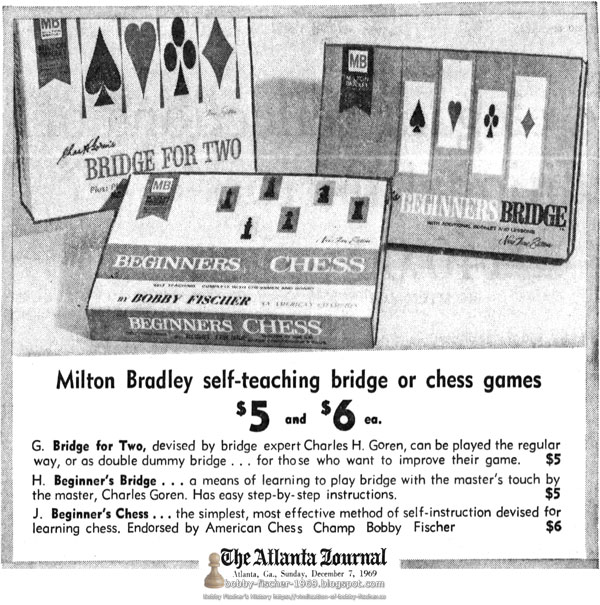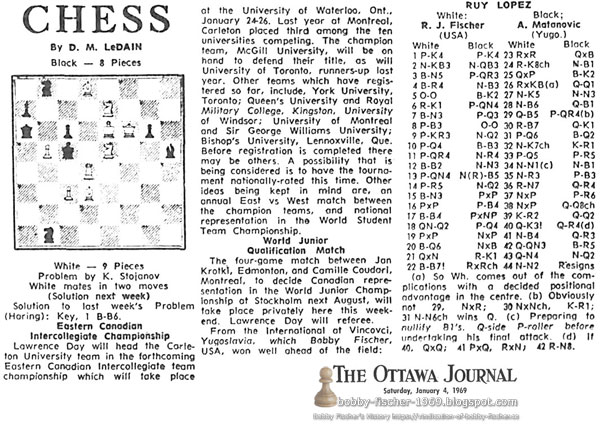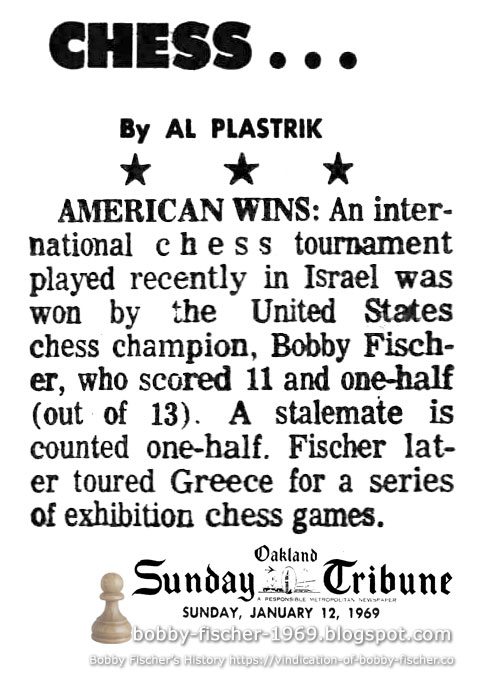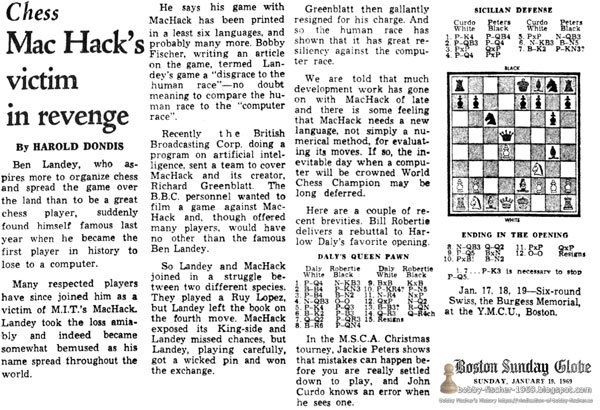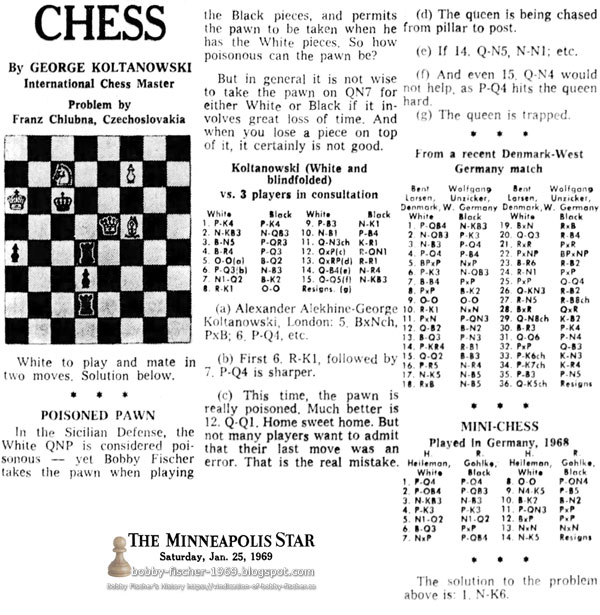< Prev
Home Next >
The Province Vancouver, British Columbia, Canada Friday, January 03, 1969 - Page 47
Chess
America's king of chess, Bobby Fischer, overwhelmed a 14-man round-robin in the recent Vinkovci, Yugoslavia, international. He scored 11-2. drawing four games and defeating nine opponents, including the entire Yugoslav contingent of eight national stars.
This result must have been galling to the prominent Yugoslav who scoffed some years ago when Fischer took the United States championship by winning 11 straight games. The opposition lacked class, the Yugoslav said, and Fischer could never carry off such a coup against Yugoslav's best.
Grandmaster Vlastimil Hort of Czechoslovakia and Grandmaster Milan Matulovic of Yugoslavia tied for second and third places with 9-4 each. Tied at 8½-4½, were grandmasters Borislav Ivkov and Aleksander Matanovic, both of Yugoslavia. International master Donald Byrne of Penn State was next with 8-5.
Fischer's victory as White in a King's Gambit with Dragoljub Minic was notable. Early in his career, Fischer wrote an article, “The King's Gambit is Dead,” presenting a long analysis to reveal its deficiencies. Evidently, be has had a change of heart.
Anyway, Minic did not use 3…Q-R5ch, the classic, obvious reply to Fischer's 3 B-B4. White could, in that case have played 4K-B1, easily recovering the time lost by a counter-attack on the enemy queen.
Black manoeuvred not to retain the pawn, but to secure the strong-point centre at his…Q4. White's 6 B-N3, however, sent the game into uncharted ways. Thus, after 10 P-Q4, it was White who was forming the strong centre. And he had regained his pawn.
The subsequent sidestep, 13 K-B2, was carefully considered by Fischer, who sealed his over-all positional edge by 14 P-B5.
Fischer's final coup, achieved by the very rook menaced by the enemy bishop, was typically, in the nick of time and irrefutable.
In the same event, Hort, as White in a King's Indian Defence, proved a sharper tactician than M. Bertok of Yugoslavia.
The salient point was 13 N-N5. This was the beginning of a foray to give up a pawn to recover decisive material later. The combination paid off after 20 NxQR.
Black's threat to win the knight by 20…Q-R4 was logical and, if it had been possible, would have given the game to Black. But Black's chance was thwarted by 21 P-B4, effecting the opening of a vital line.
Thus, 21…QxN would have lost to 22 BxNch, KxB: 23 Q-B4ch, with an evident triumph for White in all variations because White would always open the king bishop file if needed, by the opportune PxP.
Resignation was understandable in view of White's threat, BxN, ch. etc.
A thematic bishop sacrifice proved the winning weapon for Dr. Karl Burger of the Manhattan Chess Club when he faced the Marshall club star. Malcolm Weiner, during the recent match between the clubs.
The key move in this Ruy Lopez was 19 BxPch, forcing the black king into the open after 19…KxB; 20 N-N5ch K-R3. Black's last move was of course, his only resource. If 20…K-N1; 21 Q-R5 would win at once.
As the game went, it was necessary for White to play alertly. Any second-rate move might have allowed the black king to escape into safety. White made sharp progress with 23 QxPch. K-Nl; 24 Q-KR4, winning material and tempi. The crux of the issue shaped up after 28…N-B4.
Black was theoretically ahead in material. If he could force a swap of queens he would come out on top. That explained 29…Q-B5, heading for…Q-KR5. Black's hope, however, was destroyed by 30 N-N4ch, etc.
But Black had one last gamble had he played 31…BxP. If 32 KxB, Black would win by 32…N-R5ch. White, therefore, sustained his lead with 32 Q-B6ch, etc., allowing him to capture the bishop without penalty. This was enough.
In the same event, Mrs. Giselle Grosser, the United States women's champion from the Manhattan Chess Club, advanced strongly in the opening of a Four Knights' Game when her opponent. Dave Daniels, an expert, played second best with 6…NPxB. Better clearly was 6…QPxB.
Black followed up with the dubious 9…P-Q4. Certainly, Black realized White would win a pawn by 10 NxP/6. Black, however, hoped for compensating activity by 10…Q-Q3, driving the knight and gaining quick development.
But Black must have overlooked White's sharp 11 QxP. For if 11…QxQ; 12 N.-K7ch, recovering the queen and remaining two pawns up with a routine victory.
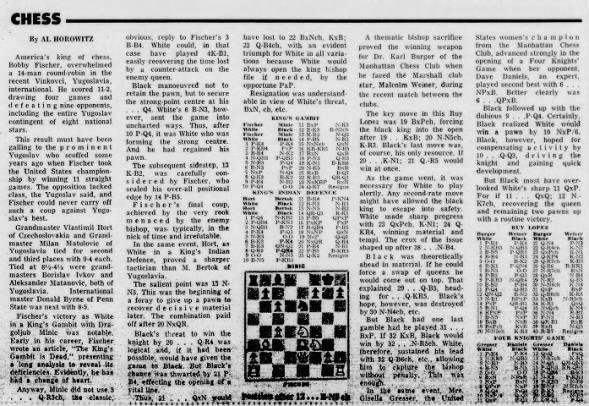 Chess by Al Horowitz 03 Jan 1969, Fri The Province (Vancouver, British Columbia, Canada) Newspapers.com
Chess by Al Horowitz 03 Jan 1969, Fri The Province (Vancouver, British Columbia, Canada) Newspapers.com
The Guardian, London, Greater London, England, Saturday, January 04, 1969 - Page 7
Chess: King of the Tournaments
PETROSIAN'S lack of impact as world champion and Spassky's superiority in challenge matches have increased the struggle among leading grandmasters for recognition as the best tournament player on the international circuit. In 1967 Larsen dominated his opponents with four successes in a row in strong events; but this year he has become more erratic and less confident since his defeat by Spassky.
Many would consider Bobby Fischer the world tournament champion, but his successes in the last four years have all been in tournaments below the highest class with the exception of his second to Spassky at Santa Monica 1966. On the evidence of the play in 1968, the king of the tournaments is Victor Korchnoi of Russia. In Beverwijk at the start of the year he finished easing up three points ahead of a field of grandmasters: in Majorca in December his score of 14 out of 17 was ahead of Larsen and Spassky (who both lost their individual games to Korchnoi) 13, Petrosian 11½, Gligoric 10½, and five other grandmasters.
Korchnoi is one of the few top players who genuinely prefers defence to attack. His defence is not passive but the flexible, psychological king which lures the opponent to over-extend himself and to be unprepared for Korchnoi's fast counters. Korchnoi's models are Lasker and Nimzovitch. The occasional criticism that, like Lasker, assesses his opponent's psyche; this week's game well illustrates his style.
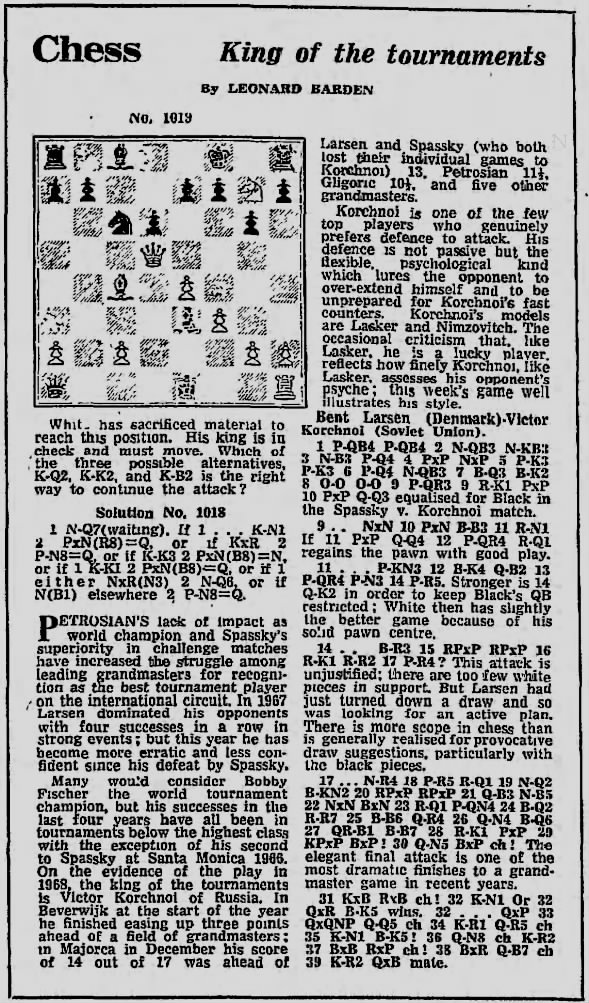 Chess: King of the tournaments 04 Jan 1969, Sat The Guardian (London, Greater London, England) Newspapers.com
Chess: King of the tournaments 04 Jan 1969, Sat The Guardian (London, Greater London, England) Newspapers.com
This article also appears in,
The Ottawa Journal Ottawa, Ontario, Canada Saturday, January 04, 1969 - Page 32
Vincovci Yugoslavia International
“From the International at Vincovci, Yugoslavia, which Bobby Fischer, USA, won well ahead of the field…”
The Courier-Journal Louisville, Kentucky Sunday, January 05, 1969 - Page 46
Morphy Against Fischer? It Would Be Quite a Game
You can always get an argument going in chess circles if the issue is one of comparing the old masters with contemporary players. No matter which side you take, there's sure to be someone to take the opposite view.
Comparisons may be odious, but they also can be interesting. The two names most frequently mentioned when the greats of yesteryear are compared with today's grandmasters are those of the immortal Paul Morphy, the amazing human computer who reached his peak more than a century ago, and the wizard considered by many to be the strongest living player, Robert J. Fischer.
In this connection, the views expressed by American Grandmaster Larry Evans seem relevant. Asked how he would rate Fischer in historical terms, Evans was quoted:
“It's been my opinion for a few years now that he's the best player in the world. I would say that he's in the same category as Morphy of Capablanca. Of course it's hard to make a comparison since they didn't have the competition that he has now.”
But what does Fischer think? In Chessworld, Fischer was quoted: “In a set match, Morphy would beat anybody alive today.”
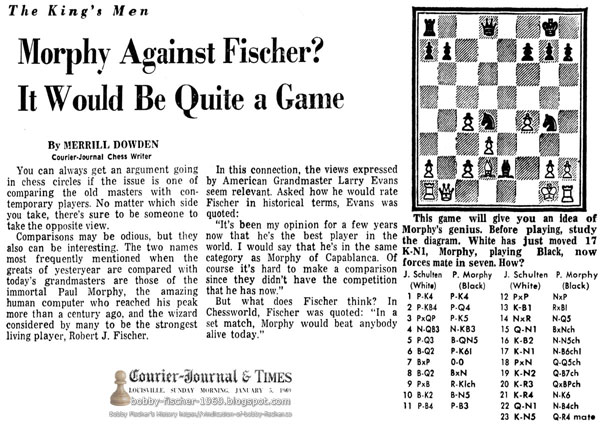
Oakland Tribune Oakland, California Sunday, January 12, 1969 - Page 125
American Wins:
An international chess tournament played recently in Israel was won by the United States chess champion, Bobby Fischer, who scored 11 and one-half (out of 13). A stalemate is counted one-half. Fischer later toured Greece for a series of exhibition chess games.
The Boston Globe Boston, Massachusetts Sunday, January 19, 1969 - Page 184
MacHack's Victim in Revenge
Ben Landey, who aspires more to organize chess and spread the game over the land than to be a great chess player, suddenly found himself famous last year when he became the first player in history to lose to a computer.
Many respected players have since joined him as a victim of MacHack. Landey took the loss amiably and indeed became somewhat bemused as his name spread throughout the world.
He says his game with MacHack has been printed in a least six languages, and probably many more. Bobby Fischer, writing an article on the game, termed Landey's game a “disgrace to the human race”—no doubt meaning to compare the human race to the “computer race”.
Recently the British Broadcasting Corp. doing a program on artificial intelligence, sent a team to cover MacHack and its creator, Richard Greenblatt. The B.B.C. personnel wanted to film a game against MacHack and, though offered many players, would have no other than the famous Ben Landey.
So Landey and MacHack joined in a struggle between two different species. They played a Ruy Lopez, but Landey left the book on the fourth move. MacHack exposed its Kingside and Landey missed chances, but Landey, playing carefully, got a wicked pin and won the exchange.
Greenblatt then gallantly resigned for his charge. And so the human race has shown that it has great resiliency against the computer race.
We are told that much development work has gone on with MacHack of late and there is some feeling that MacHack needs a new language, not simply a numerical method, for evaluating its moves. If so, the inevitable day when a computer will be crowned World Chess Champion may be long deferred.
Here are a couple of recent brevities. Bill Robertie delivers a rebuttal to Harlow Daly's favorite opening.
The Minneapolis Star Minneapolis, Minnesota Saturday, January 25, 1969 - Page 15
Poisoned Pawn
In the Sicilian Defense, the White QNP is considered poisonous — yet Bobby Fischer takes the pawn when playing the Black pieces, and permits the pawn to be taken when he has the White pieces. So how poisonous can the pawn be?
But in general it is not wise to take the pawn on QN7 for either White or Black if it involves great loss of time. And when you lose a piece on top of it, it certainly is not good.
The Guardian, London, Greater London, England, Friday, July 18, 1969 - Page 6
Alekine 0, Fischer 1
“My 60 Memorable Games,” by Bobby Fischer, has been published by Simon and Schuster at $6.95 in the United States. The English edition will appear from Faber and Faber before the end of 1969 and should be the star Christmas choice of every keen chess player. Comparison will be inevitable with Alekhine's collections of his best games, and in many respects Fischer emerges on top.
“My Memorable Games” conveys the strong, even violent, emotional drive and need for success which dominates Fischer's chess attitude as it did Alekhine's. “A check before dying” and “Bisguier slumped and his chest collapsed, as he saw that Black cannot avert the loss of a piece” are just two of the phrases which show that, for Fischer, a chess game bears a fair resemblance to mortal combat. His Russophobia appears in a muted form: “Afterwards, Geller tried to offer my opponent some sympathy. I overhead a dismayed Kholmov telling him that I had ‘seen everything.’ The game was particularly sweet because it was my first win against a Russian in almost a dozen tries.”
How does Fischer beat Alekhine? First, in extent and depth of analysis: 380 pages for 60 games incorporate some very detailed reasons for the choice of a move or what might have happened. Fischer never shirks the crisis of a game in the famous encounter with Botvinnik in the 1962 world team championship. Bobby has always claimed and the Russians have as strenuously denied that Fischer missed a win after the adjournment. Bobby discusses the decisive position on move 51 for two pages, agrees with Botvinnik's analysis from the USSR year book, but shows that the final position on move 64 of this analysis is a win for Fischer and not the draw which Botvinnik claimed. The book's detailed quotes are international. Bobby mentions Andrew Thomas's proof that he had a quicker win against Reshevsky in the U.S. championship, and John Littlewood's analysis of his game with Stein in the 1967 interzonal.
The second aspect where Fischer scores is his greater objectivity. It is difficult to forget that Alekhine's famous five queens games against Grigoriev was probably analysis or invention: or that the deep analysis to the rook sacrifice against Book at Margate 1938 was actually found by Book after the game. Fischer is constrastingly frank about his miscalculations during play, and shows an appreciation of other grandmasters more generous and dispassionate than one would expect from his earlier writing. There are three losses in the book. They include the King's Gambit against Spassky which stimulated Fischer to discover the Fischer Defence
1 P-K4 P-K4
2 P-KB4 PxP
3 N-NB3 P-Q3, and the final round game with Tal in the 1959 candidates (“The crowd was shouting and whistling with each move. Later I was informed that many sport fans were in the audience. Maybe some soccer match had been cancelled. As a consequence chess was the main attraction that day in Belgrade.”)
The third defeat is a surprising choice which will appear as next week's game: meanwhile this is probably the best collection of a grandmaster's games ever published, and a book whose English edition this autumn will be eagerly awaited.
Leonard Barden's Guardian Chess Book is reprinting: it is hoped to have further copies available within the next few weeks.
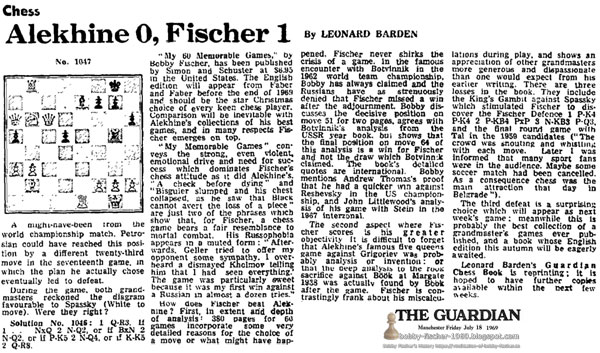
The Courier-Journal Louisville, Kentucky Sunday, October 05, 1969 - Page 54
Spassky Holds the Crown, But He Isn't Rated Highest
Who do you think has the highest chess rating in the world?
World champion Boris Spassky of the Soviet Union? Former world champion Mikhail Botvinnik or Tigran Petrosyan, also of the USSR?
Wrong!
But you're right if you guessed American Grandmaster Bobby Fischer, the genius from Brooklyn. His rating? An incredible 2720. Spassky is second with 2690; Victor Korchnoi, third with 2680 and Botvinnik fourth with 2660.
After Fischer, the only other Americans making the first 33 in the list of 200 international masters reported include Larry Evans, with 2570, and Samuel Reshevsky, 2570.
The report was filed by Arpad E. Elo, rating statistician for the U.S. Chess Federation, and it covers the international rating list for FIDE (International Chess Federation) for the period from January, 1966 through the spring of 1969.
“In most cases,” Elo said, “the game samples approached or exceeded 100 games. Thus the inadvertent omission of results from minor tournaments should not have a significant effect. The ratings must be regarded as evaluations of the average performances of the masters over a three-year period, and nothing more.
Fischer bombs his opponents right off the board with brilliancy in this gamelet. Before playing, study the diagram. Black has just moved 20 P-K5, attacking the White Queen. What is White's deadly response?
Sicilian Defense. *Black's attack on the Queen is brilliantly refuted. If 21… PxQ, 22 P-B6, followed by mate on KR8.
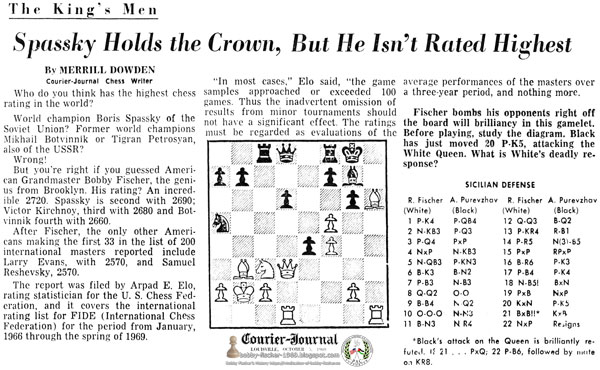
Like Mr. Boris said, Bobby was friendly and liked children!
The Atlanta Constitution, Atlanta, Georgia, Sunday, December 07, 1969 - Page 29
The Province Vancouver, British Columbia, Canada Friday, January 03, 1969 - Page 47 — Chess — America's king of chess, Bobby Fischer, overwhelmed a 14-man round-robin in the recent Vinkovci, Yugoslavia, international. He scored 11-2. drawing four games and defeating nine opponents, including the entire Yugoslav Read More
The Guardian, London, Greater London, England, Saturday, January 04, 1969 - Page 7 — Chess: King of the Tournaments — PETROSIAN'S lack of impact as world champion and Spassky's superiority in challenge matches have increased the struggle among leading grandmasters for recognition as the best tournament Read More

 The Courier-Journal Louisville, Kentucky Sunday, October 05, 1969 - Page 54 — Spassky Holds the Crown, But He Isn't Rated Highest — Who do you think has the highest chess rating in the world? World champion Boris Spassky of the Soviet Union? Former world champion Mikhail Botvinnik or Tigran Petrosyan, also of
Read More
The Courier-Journal Louisville, Kentucky Sunday, October 05, 1969 - Page 54 — Spassky Holds the Crown, But He Isn't Rated Highest — Who do you think has the highest chess rating in the world? World champion Boris Spassky of the Soviet Union? Former world champion Mikhail Botvinnik or Tigran Petrosyan, also of
Read More


 A
A
